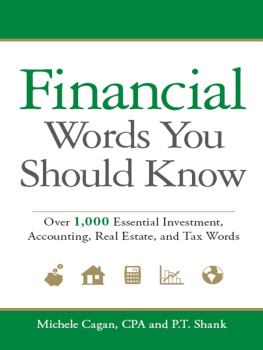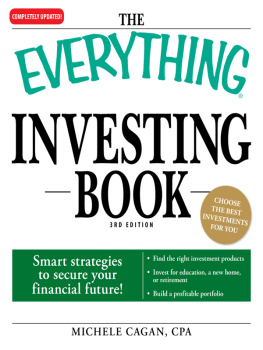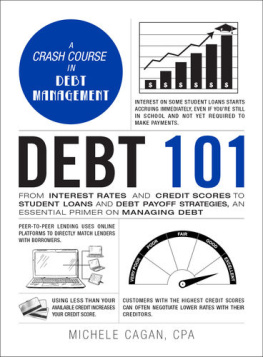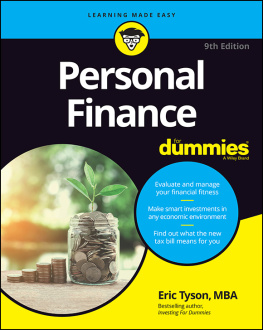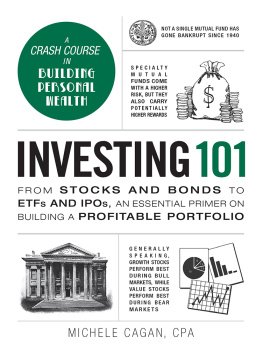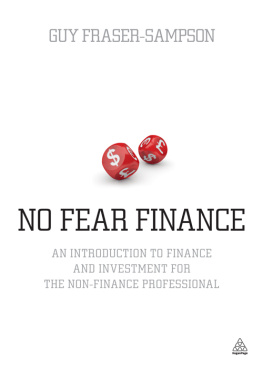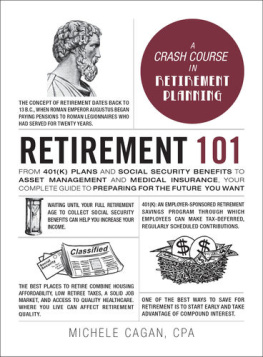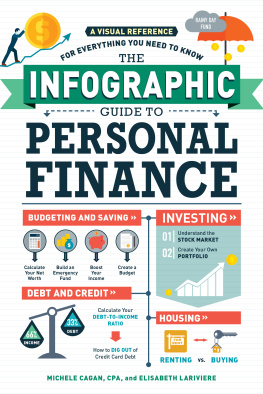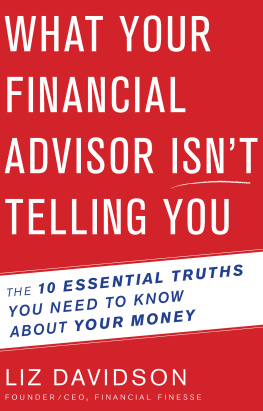Financial
Words You
Should Know
Over 1,000 Essential Investment,
Accounting, Real Estate, and Tax Words
Michele Cagan, CPA and P.T. Shank

Copyright 2009 by F+W Media, Inc.
All rights reserved.
This book, or parts thereof, may not be reproduced in any
form without permission from the publisher; exceptions are
made for brief excerpts used in published reviews.
Published by
Adams Media, a division of F+W Media, Inc.
57 Littlefield Street, Avon, MA 02322. U.S.A.
www.adamsmedia.com
ISBN 10: 1-60550-035-6
ISBN 13: 978-1-60550-035-5
eISBN: 978-1-44052-043-3
Printed in the United States of America.
J I H G F E D C B A
Library of Congress Cataloging-in-Publication Data
is available from the publisher.
This publication is designed to provide accurate and authoritative information with regard to the subject matter covered. It is sold with the understanding that the publisher is not engaged in rendering legal, accounting, or other professional advice. If legal advice or other expert assistance is required, the services of a competent professional person should be sought.
From a Declaration of Principles jointly adopted by a Committee of the American Bar Association and a Committee of Publishers and Associations
Many of the designations used by manufacturers and sellers to distinguish their product are claimed as trademarks. Where those designations appear in this book and Adams Media was aware of a trademark claim, the designations have been printed with initial capital letters.
Disclaimer: This book is not intended to take the place of professional financial advice. Please speak to a professional financial planner before making any decisions about your money.
This book is available at quantity discounts for bulk purchases.
For information, please call 1-800-289-0963.
This book is dedicated to Yogi,
my best boy (my key grip).
MICHELE CAGAN
This book is dedicated to David Willis...
for all the reasons it deserves to be.
P.T. SHANK
Contents
Financial Words You Should Know is categorized
into the following sections:
Acknowledgments
I d like to thank P. T. Shank, someONE Ive really come to count on. Also, thanks to Jacky Sach, whos done so much for my career. And a big thanks to my ice cream supplier, without whom I would have had nothing to eat while writing this book.
Michele Cagan
A s with any book, there are people I must thank. First, Michele Cagan for one! One New Book! HAH-Hah-hah. Al Burgos, who taught me so much last time that I was able to use again this time. Heather McLean and Steve Tolle, for being such amazing cheerleaders from the very beginning. The usual suspectsMitchell and Ed; Christine and Scott; Bridget and the Muppet; and Shannafor just being there. Always. And, of course, Dr. C. Rex Mix and Betty Witt.
P. T. Shank
Introduction
I f youre over the age of eighteen, you either have a retirement account or know youll need one. At some point in your life, youve probably at least thought about buying a house, a condo, or a car. And most of us understand the general idea of investing, managing our finances, and using our money to make more money. Its the details that sometimes bog us down.
For too many people, our retirement and savings planning is limited to the annual visit from the HR department where we work. They come in, talk about insurance, assets, retirement, and mutual funds... and it all goes straight over our heads. For those of us who are self-employed and have to wade through all the options without the benefit of a human resources representative, it can be even more daunting. Mutual funds, money market accounts, stocks, bonds, derivatives... sometimes it seems as if it would be easier to keep our money under our mattresses and hope for the best. But thats probably not an ideal solution and it makes your mattress very lumpy. So what to do?
Thats where Financial Words You Should Know comes in. While this book wont, and shouldnt, replace sound financial advice, it will help you better understand the advice youre getting. It has more than 1,000 of the most commonly used financial words and phrases you are likely to come across.
Finances are importanttoo important not to understand. Financial Words You Should Know can help. And you wont need to sleep on a lumpy mattress.
Financial
Words You
Should Know
ACCOUNTING
Accountants opinion
A formal statement prepared by an independent certified public accountant (CPA) that spells out his judgment about the veracity and completeness of a set of financial statements prepared by company. When he believes those statements to be materially complete and accurate, his judgment will be unqualified. A qualified judgment indicates that the statements may not be reliable sources of information, and that potential investors should beware.
See also: Annual report, CPA, Financial statements
Pete needed anaccountants opinionbefore the bank would even consider his request for a business loan.
Accounts payable (AP)
Short-term liabilities incurred by a business when it buys on credit from suppliers. Often associated with inventory purchases.
See also: Balance sheet, Liabilities
The flight schools bookkeeper kept track of theaccounts payableto ensure the school stayed in good standing with their vendors.
Accounts receivable (AR)
An asset held by a business that measures the money still owed to them for their credit sales, but AR does not include credit card sales, unless the card is issued by that business, for instance, a department store card.
See also: Asset
Theaccounts receivableoffice kept track of who owed the company money.
Accrual
An accounting term used to describe revenue or expenses recognized although no cash has yet changed hands (for example, interest earned but not yet received).
See also: Accounts payable, Accounts receivable
The bookkeeper accounted for all theaccrualsat the end of the period so the companys books would be accurate when the tax accountant arrived.
Accrued interest
Money earned on an investment but not yet paid, typically occurring for investments (such as bonds) with fixed earnings and payout dates.
See also: Bond
Jack kept track of hisaccrued interestso he knew approximately how much to expect when the check came.
Accumulated depreciation
An accounting measure that holds the cumulative total of depreciation taken over the life of an asset.
See also: Asset, Depreciation
Theaccumulated depreciationon the machinists equipment made it appear worthless on the books, even though it was really worth thousands of dollars.
Acid-test ratio
A measure of a companys ability to pay its short-term liabilities on time without having to sell off inventory. Calculated by dividing total short-term liabilities into the sum of cash, accounts receivable, and short-term investments. Results of 1.0 and higher indicate good liquidity. Also called the quick ratio.
See also: Liabilities, Liquidity, Ratio analysis
Juanita always showed her clients the results of theacid-test ratiobefore recommending an investment in a particular company.
Next page
